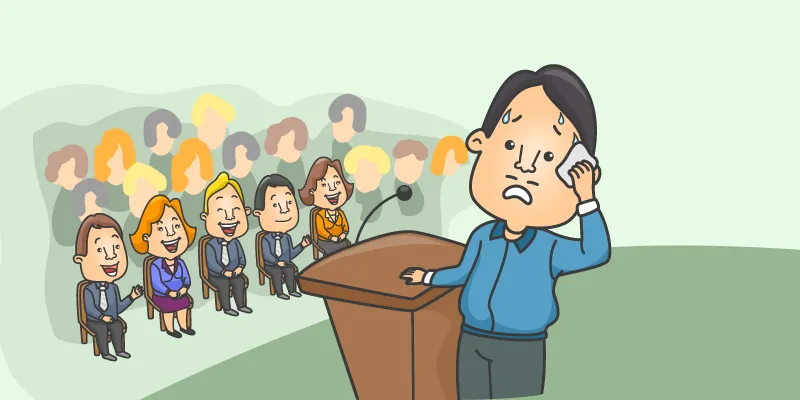“According to most studies, people's number one fear is public speaking. Number two is death. Death is number two. Does that sound right? This means to the average person, if you go to a funeral, you're better off in the casket than doing the eulogy.” – Comedian, Jerry Seinfeld

Image : shutterstock
Most people freeze when asked to give a speech. This is often misunderstood for fear of speaking in public. The truth is people freeze when attention is on them without warning. Say, the boss is giving a pep talk at an office picnic, in the middle of which he suddenly points to one of his teammates with a question. That person, more often than not, would freeze. The reason this happens is that we're in a vulnerable position when we're unprepared.
Public speaking is not some sort of art as they have made it to be. As long as you have something (important) to say, you've got to say it. As long as you have something to say, it means that you have applied thought. If anybody has the right to speak, it is those who spare some time to think. So, if you have thought enough to have something to say, here are three rules to follow to bring value to those listening to you, and also to do justice to your own thoughts.
If you've got something to say, say it interestingly
In her book, The Art of Civilised Conversation, author Margaret Shepherd points out a critical insight into why we don’t realise when we become boring. She says, ''Is anyone asking you questions about what you're saying? If not, maybe it's time to end the story or ask the other person a question.''
Having to listen to boring speeches is one of the worst punishments. We've all endured it one time or another, and we don't need to learn this lesson again. When you have a speech to give, make sure it's interesting. If you want the public to listen to you, the least you can do is not be boring.
Have (just) enough to say
How much do you know about the subject you're going to speak about? How much knowledge do you possess on the topic? A poorly researched speech is disrespect to your audience. You need to have just enough to say. Don't squeeze in all of your research into your speech. Edit and format your speech to make it flow in an orderly fashion. Talking for too long, or going beyond your stipulated time, is rude and a sign of disrespect to the audience, the organisers of the event, and other speakers.
Always pay attention to the situation you're in
An article on entrepreneur.com suggests to treat the mind as a muscle, ''Practise concentration by turning off all distractions and committing your attention to a single task. Start small, maybe five minutes per day, and work up to larger chunks of time. If you find your mind wandering, just return to the task at hand.''
Public speaking is not only when you're addressing a large gathering. Public speaking is any situation where you're required to speak your mind — it could be a morning meeting with the team, a colleague's farewell, or the time to submit your project report. No matter where you are or what situation it is, you might find yourself with an audience expecting you to speak. Always pay attention to what's going on around you. That way, you will have things to say if you're called to share your POV, and not freeze and shy away.
The ability to speak well, and articulate sharply, is a key factor contributing to the success of one’s career. Think, and speak your mind always, and your fear of public speaking will vanish in no time.







